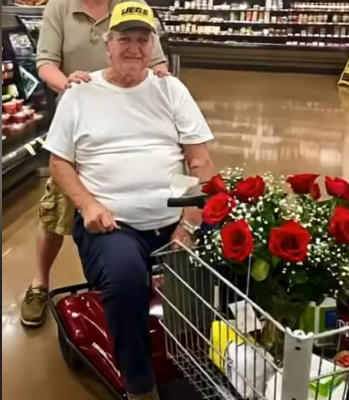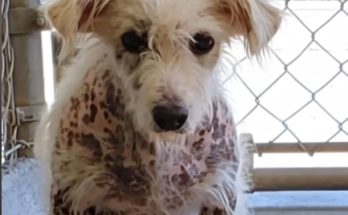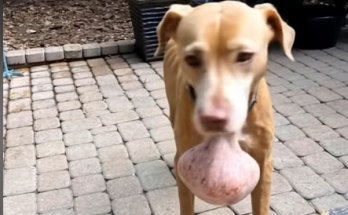Every Saturday morning, I wheel my dad into the grocery store on his little red scooter. Same store, same route. We always start by the deli—he likes to wave at Brenda behind the counter—then loop past produce, grab some bread, and finally, roses. Always red. Always twelve. Always for Mom.
He’s been doing that ever since she passed. Says it helps him feel like she’s still around, like she’s waiting at home for him. It breaks me a little every time, but I never say that out loud.
But this last Saturday was different.
We were rolling past the flower section when I reached for the usual bunch, and he put his hand on mine. Real soft, but firm.
“Not today,” he said.
I looked at him, confused. “You don’t want the roses?”
He shook his head. “I want the roses. But I want you to take them somewhere else.”
I thought maybe he meant her grave, but he goes every Sunday for that. I started to ask, but he was already fishing around in his jacket pocket, pulling out a folded slip of paper. He handed it to me like it weighed ten pounds.
“Just… go there. Today. Give her the flowers. And don’t ask questions until you do.”
The handwriting on the paper wasn’t his.
And the name on it wasn’t Mom’s.
It read: “Lina. Apartment 3B, 48 Willow Lane.”
No last name. Just Lina.
My dad had been a widower for six years. I’d never heard this name in my life.
I looked at him like he’d grown another head. But he just stared at the roses, his fingers fiddling with the corner of the folded list he always kept for shopping.
“Can you do that for me?” he asked quietly.
I didn’t want to. Something about it made my stomach knot. But I nodded. “Yeah. Okay.”
So I paid for the flowers, dropped Dad off at home, and followed the GPS to Willow Lane.
It was a quiet street on the other side of town. Older apartments, three stories, with ivy climbing up the sides. Apartment 3B had a small balcony with wind chimes tinkling in the breeze.
I climbed the stairs, clutching the roses like a rookie delivery guy, and knocked.
A few seconds later, the door cracked open, just enough to see a woman’s face peek out.
She looked to be in her sixties. Neatly brushed silver hair, warm hazel eyes. She blinked when she saw the flowers.
“Hi,” I said awkwardly. “Um… these are for you. From, uh, Frank.”
She didn’t say anything for a second. Then she opened the door the rest of the way, slowly, like she wasn’t sure whether to smile or cry.
“Frank,” she whispered, and reached out to touch the petals. “He remembered.”
I handed them over. “He… remembers every Saturday.”
She gave a shaky smile, then looked at me. “Do you have a moment to come in?”
I hesitated. But curiosity was already gnawing at me.
“Sure.”
Her apartment smelled like lavender and old books. There were paintings on the walls—soft landscapes, a few portraits. Everything about the place felt careful and full of memory.
She motioned for me to sit, then went to the kitchen to grab a vase.
“I didn’t think he ever would,” she said over the clink of glass. “Reach out again.”
“You knew him?” I asked.
She nodded. “Forty-two years ago, your father and I were supposed to get married.”
I froze. “What?”
“We were young. Barely out of school. We were each other’s first everything. But then he got scared. Or maybe I did. Doesn’t matter now. He left. I married someone else. He married your mother.”
I sat back, staring at her.
“We saw each other again, briefly, at a reunion twenty years later. Just talked. Nothing more. Then again… just after your mom passed. He came by my gallery.”
Gallery?
“I run a little gallery downtown,” she added, answering the question I hadn’t asked. “He walked in, carrying a bouquet just like that. Said he was just visiting. We talked for an hour. Then he never came back.”
I was stunned. “He never told me. Never mentioned you.”
She shrugged gently. “Some stories aren’t meant to be retold until the end.”
We sat in silence for a bit, letting the flowers settle between us.
“I think,” she said finally, “he just wanted to know that I was okay. That I didn’t hate him. And maybe, just maybe, that a part of what we had still lived somewhere in the air.”
She looked out the window as if watching a memory pass by.
I left not long after. She thanked me again, and I promised—though I don’t know why—to come back sometime.
When I got home, I found Dad dozing in his chair, the shopping bag beside him.
“Did she get them?” he asked without opening his eyes.
“Yeah. She said you were supposed to get married.”
He smiled faintly. “We were. But if I had… I wouldn’t have had you.”
It hit me then—this wasn’t about lost love. It was about unfinished chapters.
“You miss her?” I asked.
“Every day,” he said. “But not the way I miss your mom. Your mother… she was my life. But Lina—she was a page I never turned.”
That night, I couldn’t sleep. I kept thinking about how carefully he’d carried this memory, how he’d held it close but never let it interfere with what he built after.
The next Saturday, he didn’t ask me to take roses to Lina again. But he did ask if we could drive by the gallery. Just to see it.
It was closed that day, but he smiled when he saw the sign with her name on it. He didn’t ask to go in.
We just sat in the car for a while, then drove home.
Weeks passed. Then months.
Dad got weaker, slowly. His scooter rides turned into wheelchair walks. Then short ones. Then none.
On one of the last good days, he asked if I could invite Lina over.
“I just want to see her,” he said. “Not for long. Just once more.”
She came, dressed in soft green, carrying a small book of poems. They didn’t speak much. Just held hands. She read him a few lines, then kissed his forehead and left.
Three weeks later, he was gone.
We buried him next to Mom, like he’d asked.
But I sent twelve red roses to Lina that day. No note.
She knew.
A year passed before I saw her again. I found myself at her gallery one rainy afternoon. She greeted me like an old friend, and we sat on a bench, surrounded by paintings.
She showed me one in the back room. A landscape of a hill with two trees, bent toward each other, branches tangled.
“Your father painted this,” she said.
I stared. “He never painted.”
“He did once. For me.”
I bought it on the spot. It hangs in my living room now, next to a photo of my parents. Not because I think he loved Lina more—but because I now understand that love isn’t always either/or.
Sometimes, love lingers in quiet corners of the past. Not to compete, but to be remembered.
And remembering doesn’t mean betrayal.
It just means we’re human.
If I’ve learned anything from my dad’s quiet Saturday ritual, it’s this—love leaves marks. Some you carry. Some you pass on. And some, like roses for a woman you almost married, are meant to close the loop.
Thanks for reading. If this story moved you, share it with someone who believes in second chances—or unfinished chapters. ❤️



